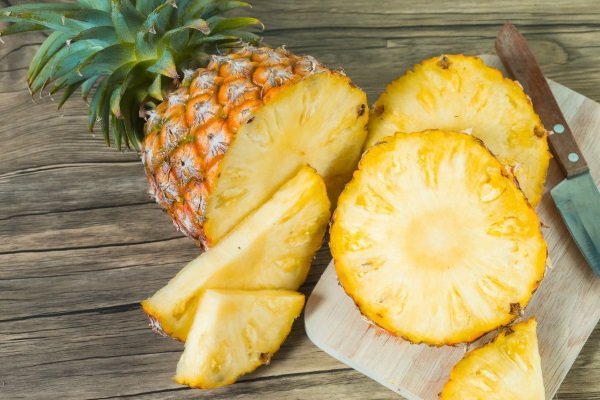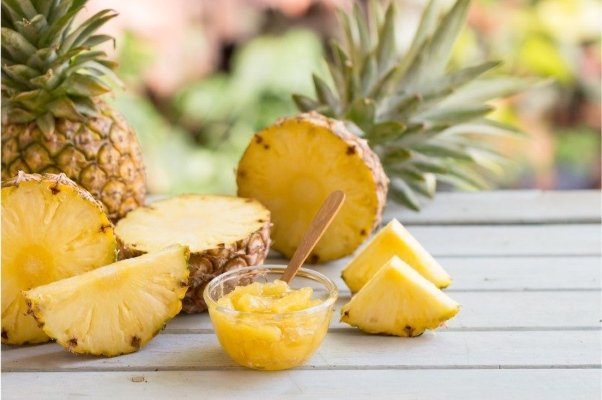Pineapple during pregnancy: benefits, harms, contraindications
During pregnancy, the taste preferences of the expectant mother often change. But many foods can be harmful to the body. Can you eat pineapple during pregnancy, especially in large quantities? Will it harm the child?
Pineapple composition
The fruits of an exotic fruit contain a lot of useful elements:
- bromelain
- phosphorus
- carotene
- vitamin PP, groups B, D, A, C
- calcium
- folic acid
- iron
- sodium
Only fresh fruit or freshly squeezed juice from it contains such irreplaceable components. A canned product loses almost all of its positive qualities and turns into an ordinary dessert that has no value.
Bromelain- a useful and rare substance contained in pineapple and improves protein absorption. It has a positive effect on the work of the digestive system, improves well-being, preserves the youth and beauty of the skin, helps to dissolve fibrin plugs formed in the veins.
Along with this, bromelain has antioxidant and antiseptic effects. Thanks to him and the complex of minerals and vitamins, fresh fruit is considered useful for women during pregnancy, although you should not get carried away with such an exotic fruit.
In large quantities, the active enzymatic compound increases uterine tone.
Therefore, the frequent use of pineapple in the first trimester of pregnancy, especially in the presence of bleeding and pulling pains in the lower abdomen, can contribute to the termination of pregnancy.
Ripe pineapple is rich in sucrose, nutritional fiber, antioxidants, organic acids. It is quite acceptable to introduce 1-2 fetuses per month into the diet during pregnancy. It is important to choose ripe fruit, not overripe or prematurely plucked.
Useful properties of pineapple
A couple of slices of ripe fruit will not harm a pregnant woman. He helps:
- fight puffiness;
- balance the composition of the blood;
- suppress nausea with toxicosis;
- thin the blood, eliminating the risk of thrombosis;
- normalize blood pressure;
- improve digestion;
- restore appetite;
- strengthen the cardiovascular system;
- get rid of vitamin deficiency.
Refreshing sweet pulp with sourness helps to overcome the signs of toxicosis, due to which many expectant mothers lose weight and eat poorly. Lack of important trace elements and vitamins negatively affects the overall health and proper development of the fetus.
Why pineapple is useful (video)
What is useful for a tropical fruit for humans and how to choose the right nutritious fruit - we learn from the video:
Irreplaceable elements of the fruit
Fruit from hot countries activates protein digestibility. A piece of pineapple is good to eat after eating meat or fish. During viral epidemics, pineapple strengthens the immune forces, as it is rich in vitamin C. It actively increases the resistance of cells to viruses and infectious foci, and also removes toxins, free radicals and poisonous compounds from tissues, helps to absorb vitamin E, as well as iron, strengthens the walls arteries and blood vessels.
Together with vitamins and irreplaceable mineral salts, folic acid enters the body of a pregnant woman with a piece of pineapple, which is important at the stages of the formation of the future baby's body. It affects the formation of the central nervous system of the fetus. Lack of folic acid is fraught with improper pregnancy and serious health complications for the baby. Therefore, pregnant women are advised to drink folic acid for the entire first trimester, and in addition, you can eat pineapple salad several times a month.
Pineapple pulp is rich in phosphorus and calcium, which form the brain and skeleton of a child. Without sufficient nutrition of these elements of the baby's cells, the "pulling" of minerals from the mother's body begins. As a result, many women have crumbling teeth and deteriorating joints.
A small amount of natural iodine is necessary for the expectant mother. It contributes to the proper formation of the thyroid gland and the nervous system of the fetus. The unborn child may even develop mental retardation if the mother's body lacked iodine during gestation. Therefore, it would be good to add pineapple, seaweed, iodized salt to the diet of a pregnant woman, or take iodine preparations.
Pieces of ripe pineapple are a source of iron, which is important for blood. This trace mineral is indispensable for the creation of hemoglobin, which delivers oxygen to the placenta. The situation is dangerous if it is not enough in the body, then doctors prescribe additional sources of iron in the form of iron preparations. In addition to the prescribed treatment, you can eat pineapple slices doused with homemade yogurt.
In the 1st trimester, acute anemia (iron deficiency) is fraught with abortion. To exclude mental underdevelopment in the toddler, iron-containing foods, including exotic pineapple, should be added to the diet.

Potential harm from pineapple
You can not include a tropical fruit in the menu if there is:
- tendency or threat of premature birth;
- the threat of miscarriage (the presence of bleeding, pulling pains in the lower abdomen, etc.);
- increased tone of the uterus;
- gastritis or ulcer (fruit increases acidity);
- allergic reaction;
- diabetes mellitus (including gestational type).
It is enough to consume no more than 150 grams of sweet pulp or 200 ml of pineapple juice per day. It is recommended not to lean in large quantities on the fruit, as its acids can irritate the oral mucosa and destroy tooth enamel, as well as cause the uterus to contract. Pineapple juice packaged and canned product contain a lot of sugar and not an ounce of use.
For women in position, according to gynecologists, pineapple is contraindicated in large volumes, since it is capable of disrupting digestion and causing the uterus to contract. An upset stomach often leads to severe dehydration. Bromelain from pineapple pulp increases the tone of the uterus, so it is dangerous to inject it at risk of premature birth and miscarriage.
Is it possible for pregnant women to have canned pineapple
Often among the population, a canned product overshadows fresh fruits. It is especially actively used in baking, desserts and on New Year's holidays.
Canned pineapples are used as snacks or added instead of cookies to a cup of morning tea. Can you eat canned fruit during pregnancy?
This is a low-calorie product containing only 60 kcal per 100 grams. This is the only plus of thermally processed tropical fruit. The main useful component bromelain is completely absent in it. This element is very sensitive to heat treatment and degrades when exposed to high temperatures.
Canned fruit often causes allergies in pregnant women, although it may not have manifested itself earlier, therefore, during lactation and waiting for the baby, they should be abandoned and replaced with healthy and fresh fruits.
How to choose a healthy ripe fruit
Unripe or overripe pineapples can be harmful to the body. They contain too much bromelain. Severe poisoning can be obtained from overripe pulp, in which fermentation processes have already begun, and the multiplication of bacteria has intensified.
Fresh fruit should not have a harsh sweetish aroma. On the cut, its flesh is yellow. It is undesirable if the inside of the pineapple is light, that is, not quite ripe. The cut fresh fruit is eaten immediately. It is not worth storing it for a long time, even in the refrigerator.

You should not deprive yourself of the pleasure of eating your favorite tropical fruit during pregnancy. The main thing is to choose a ripe fruit and eat it fresh in small quantities and not often. So it will benefit, strengthen immunity and improve overall well-being, normalize the processes associated with the laying of the internal organs of the fetus.
 How to have the perfect date when you're not romantic
How to have the perfect date when you're not romantic What diseases do you need to drink coffee - benefits and effects
What diseases do you need to drink coffee - benefits and effects All my brown eyeliners
All my brown eyeliners